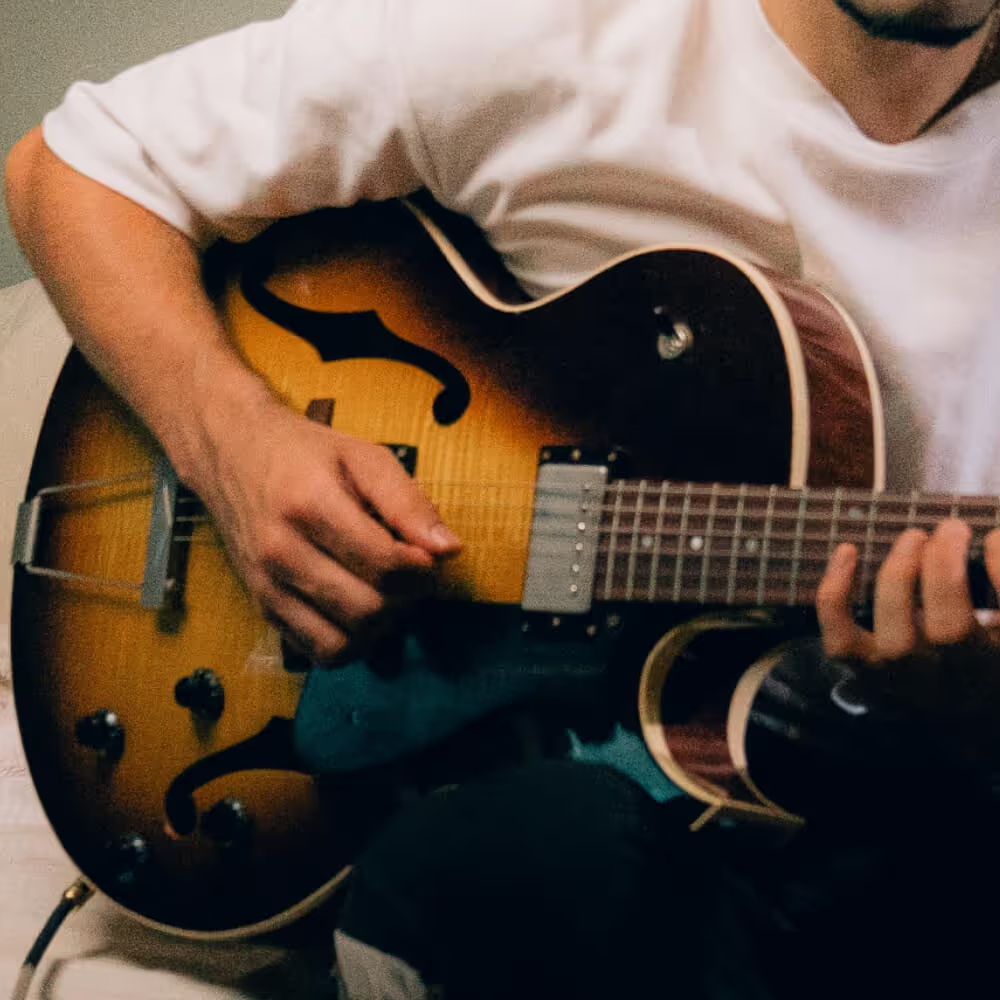7 Major Scale Modes in 7 Days
Take the headache out of learning modes.
Intermediate guitarists
Looking to break out of pentatonic boxes and spice up your soloing? You've come to the right place.
7 days
Sam will guide you through 7 days of step-by-step instruction with interactive TAB and daily assignments.
Unlock modes
By the end of this class, you'll be able to hear, visualize, play, and solo with the 7 modes of the major scale.
Take the next step
Dive into melodic minor modes or keep progressing with advanced courses and guided practice plans.
What you'll learn
Each day, Sam will break down one major scale mode and walk you through how to use it in a soloing context.
- New language to level up your improvisational skills
- Practical theory that won't put you to sleep
- Explore each mode with a collection of jam tracks
.avif)
Curriculum
Stay focused with this step-by-step learning program designed by our expert team of music educators.
Your guided learning pathway
This Master Class is your intensive, step-by-step introduction to the seven modes of the major scale – a fundamental area of study for any guitarist serious about becoming a great improviser.

Ionian
We'll start with the most common scale in Western music: the major scale.
It’s vital to have a deep understanding of this mode, no matter what style of music you play.
.avif)
Lydian
Next up, another versatile scale: the fourth mode of the major scale.
We use Lydian over major 7 chords for a more colorful and “jazzy” sound than the Ionian mode.

Mixolydian
After that, it's time for the fifth mode of the major scale.
Widely used in funk, blues, jazz, and rock, Mixolydian is a great choice for playing over a dominant 7th chord.
Day 4. Dorian
Dorian is one of the most popular minor scales. We typically use it with minor 7 chords, which makes it a great option for soloing over grooves in jazz, funk, or rock.
Day 5. Aeolian
Aeolian is a widely used mode and a defining sound for “minor songs” (which is a lot of songs) so it's worth spending a significant amount of time exploring.
Day 6. Phrygian
Phrygian is the third mode of a major scale and is used over minor 7 chords. It's used less often than other minor scales, but it’s a fun “exotic” mode to explore.
Day 7. Locrian
Whenever you see a m7b5 chord, your go-to scale is Locrian. If you’re a jazz guitarist, this mode is an important one to know.
Overview
Our team of graduate-level educators and pro guitarists developed this Master Class based on industry-standard, college-level pedagogy. The lessons teach modes in a simplified music-first way, prioritizing information so that you walk away with a deep understanding of modes in the shortest-possible time.
Each day, Sam will introduce a different mode. First, he'll walk you through the theory of the mode in an easy-to-understand way. Then, he'll walk you through when and how that mode is most commonly used. Finally, you'll get a scale diagram and jam track to explore the mode for yourself, which will help you put the theory behind the mode into a working musical context.
Days 1 - 3
Ease into the class with the major scale. After building your major scale foundation, dive into two other "major-type" modes that live within it.
Day 1. Ionian
First up is the major scale, also known as the Ionian mode. It's the most common scale in Western music. It's vital to have a deep understanding of this mode if you're a serious guitar player, no matter what style of music you play. Sam covers when you should and shouldn't use Ionian and mindfully points out the "avoid note" to wrap up the lesson. Day 1 serves as the foundation for subsequent lessons.
Day 2. Lydian
The Lydian mode is the fourth mode of the major scale. It’s used over major 7 chords and has a more colorful and “jazzy” sound than Ionian. This is a must-know scale for guitarists of all styles. You'll explore examples and learn the Lydian chord-scale relationship. Plus, Sam helps you understand when to use Lydian vs. Ionian.
Day 3. Mixolydian
Mixolydian, the fifth mode of the major scale, is a great choice for playing over a dominant 7th chord and is widely used in funk, blues, jazz, and rock. In short, this is another must-know scale. Sam goes on to explain the Mixolydian chord-scale relationship and elaborates on how Mixolydian is often played over 12-bar blues and funk jams.
Days 4-6
Next, you’ll learn three “minor-type” modes.
Day 4. Dorian
Dorian is the second mode of the major scale and is one of the most popular minor scales. We typically use it with minor 7 chords, which makes it a great option for soloing over minor grooves in jazz, funk, or rock. It’s essential that you develop a deep understanding of this mode.
Day 5. Aeolian
Aeolian is widely used across all genres of music. It’s a defining sound for “minor songs” (which is a lot of songs) so it's worth spending a significant amount of time exploring.
Day 5. Phrygian
Phrygian is the third mode of a major scale and is used over minor 7 chords. It's used less often than other minor scales, but it's a fun and exotic scale to explore. While Phrygian is a fun scale to achieve a "Spanish" vibe, it's not used often in pop, R&B, or jazz.
Day 7
On the last day, we cover the mode that jazz players cherish and most others dismiss.
Day 7. Locrian
Locrian is the seventh mode of the major scale and is used over m7b5 (half-diminished) chords. Whenever you see a m7b5 chord, your go-to scale is Locrian. M7b5 chords are common in jazz and in jazz-influenced music like R&B. If you’re a jazz guitar player, this mode is an important one to know, but if you’re a rock/pop player it’s less important.

Student stories
REAL students
Don’t take our word for it, take theirs
What guitarists love about this course

FULL REFUND, NO QUESTIONS ASKED
If you don’t get better, we’ll give you your money back
We’re so confident that Pickup Music can help you make progress that we’re underwriting your membership with a 60-day satisfaction guarantee.

Your Instructor
Sam Blakelock
Sam Blakelock is a guitarist, educator, and the founder of Pickup Music. He's an expert at helping guitarists of all levels tackle fundamental techniques and complex topics in a straightforward & practical way.
Explore LessonsLimitless learning.
All-inclusive access to every course.
Frequently Asked Questions
Got a different question? Message us in the chat pop-up.
Is Pickup Music right for me?
Are you a guitar player who feels like you haven’t made progress in a few months… years… or even decades?
You’re probably stuck in what’s called the ‘intermediate plateau’. This is very common and can be very frustrating.
What’s the cause? Well, it’s pretty easy to learn the basics on guitar. Learn a few open chords and you can play Wonderwall and hundreds of other songs. Learn a couple of scales and a few licks and you can play some lead.
But what then? Triads? Modes? Arpeggios? The phrygian scale?!
Without a clear plan and learning system you fall back to playing the same old chords and licks over and over again. Or you bounce around free lessons online but nothing seems to stick. It’s a recipe for a lot of practice without much progress.
That’s where Pickup Music can help. We specialize in taking players stuck in a guitar rut and turning them into advanced guitarists.
We do this through Learning Pathways that take you on a step-by-step journey towards fretboard mastery. We give you a highly structured system that shows you exactly what to work on each week to make serious progress.
These Learning Pathways take the guesswork out of your practice routine. You are guided through a proven grade-by-grade system with daily lessons, play-along practice exercises and interactive workouts.
But it’s not all about theory. We apply everything you learn to real music. That’s why every grade of our Learning Pathways build up to performing a song with a live backing band. This simulates what it’s like to play a real gig, with real musicians. It’s the absolute best way to learn.
You also get 1:1 video feedback on your playing from our expert instructors and can attend weekly live lessons. This personal feedback makes Pickup Music the closest thing to taking in-person lessons, but at a fraction of the cost.
So does this method actually work? Will you see results in your playing?
The most common thing we hear from new members is that they’ve made more progress with Pickup Music in a few months than in years of teaching themselves. As one member recently told us, “I'm finally seeing progress for the first time in many years”.
Want to hear about other members’ experiences with us? Read our independent Trustpilot reviews.
Is Pickup Music worth the money?
Private guitar lessons will cost you about $50 per lesson or $2,600 a year.
Going to a music academy will cost you about $40,000 a year.
A Pickup Music membership will cost you just $180 for the whole year.
That works out to 50 cents a day!
But it’s not just about the money. It’s about not wasting your precious time. It’s about making actual progress on this beautiful instrument.
By following our proven Learning Pathway system, you can stop wasting your time and effort trying to guess what you should practice next. Our guided programs eliminate the guesswork so you know exactly what you need to focus on each day and week to make lasting progress with guitar.
What makes Pickup Music better than other guitar lesson sites?
Most online guitar lesson sites are very good at teaching one-off songs and licks. Or they get super famous guitarists to record one-hour video lessons talking at length about their particular style and career.
The problem is that these approaches don't stick. They don’t help you to actually get better as a guitarist. You can waste a lot of time bouncing around these types of unconnected, one-off lessons. It’s a recipe for a lot of practice without much progress.
Pickup Music takes a different approach. We give you a highly structured system that shows you exactly what to work on each week to make serious progress. We take you beyond the basics through a step-by-step journey towards fretboard mastery.
By following a Pickup Music Learning Pathway, you are getting the most guided way to learn guitar. Over 6 grades, you are taken through daily lessons and practice exercises that carefully explain what’s going on behind the music.
Each grade then builds up to song performances that apply everything you’ve learned with a live backing band. These challenges - where we simulate what it’s like to play a real gig, with real musicians - is the absolute best way to learn.
The Learning Pathway method takes the guesswork out of your practice routine. Most guitarists start to see a rapid acceleration in their progress in a matter of weeks.
You can also get 1:1 video feedback on your playing and weekly live lessons. This personal feedback makes Pickup Music the closest thing to taking in-person lessons, but at a fraction of the cost.
Want to hear about other members’ experiences with us? Read our independent Trustpilot reviews.
What exactly do I get from a Pickup Music membership?
When you become a Pickup Music member you get unlimited access to our huge library of lessons:
- 13 Learning Pathways giving you step-by-step instruction over 3 months
- 47 Master Classes going deep into different styles over 2 weeks
- 500+ original songs from some of the world’s best modern guitarists
- 100+ essential lick packages to add new flavors to your playing
- 200+ 5 minute lessons for bite-sized learning.
You get to enjoy amazing features that create a premium learning experience:
- day-by-day lessons
- 1:1 video feedback on your playing
- weekly live lessons
- progress tracking
- interactive TAB
- multiple HD camera angles
- play-along practice exercises
- downloadable course notes and diagrams
- quizzes to test your understanding
- jam tracks with the Pickup Music Live Band
- exclusive members-only forum, contests and giveaways.
How do the Learning Pathways work?
Learning Pathways are kind of our special sauce here at Pickup Music. They take all the guesswork out of what to practice.
You get day-by-day lessons, play along practice exercises with your instructor, interactive jams with the Pickup Music live band and you can submit videos of your playing for feedback from the Pickup Music team.
We designed this system so that you will know exactly what to practice every time you pick up the guitar. This means that even if you only have time to practice with us once a week, you will still make great progress by following a Learning Pathways.
How often do I need to practice to see results?
Ideally you would practice about three times a week for 30 minutes at a time. But we know that life gets in the way sometimes! So here’s the good news: deliberate practice matters so much more than how often you practice.
After working with thousands of guitarists, we’ve found that the most important thing is to know exactly what you’re going to practice before you pick up the guitar. Even if you can only use Pickup Music a few times a month, you will still make really good progress if you stick to the step-by-step structure of our Learning Pathways.
How long are the lessons?
Pickup Music's lesson plans are designed to suit the amount of time you have available to practice.
- Only got a few minutes? Try our 5-Minute Lessons to quickly add a new skill to your toolbox.
- Got half an hour? Try one of our Essential Lick Packages or original Songs to expand your vocabulary in different genres.
- Got a couple of days? Try a Master Class with one of our world-renowned artists. Each class is broken up into short, digestible modules focused on one topic.
- Ready to really commit to a multi-week program? Try one of our Learning Pathways. Over 3 months and 6 grades of learning, these detailed courses will take you on a day-by-day journey to master each level in the genre. Learning Pathways include daily practice exercises so you know exactly what to focus on. These courses are the best way to make lasting progress.
Whichever approach you choose, we recommend building the exercises you learn into your daily practice schedule. The best way to improve as a guitarist is through a consistent practice routine rather than sporadic, longer sessions. Learning guitar is a day-by-day, life-long journey.
Can I take the lessons at my own pace?
Everything on Pickup Music is designed to be taken at your own pace. There are no deadlines, so you can work at your own speed. You can stay on a topic until you really understand it before you move on.
While we divide our Learning Pathways into ‘days’ - this is a suggestion only. Some learners might take a few days in one sitting, while others will spend a few sessions on a single day. You can go at the pace that feels most comfortable to you.
How does the 1:1 video feedback work?
We want our members to get the closest thing possible to in-person lessons but at a fraction of the cost. That's why you can now get individual video feedback on your guitar playing from our team of expert instructors.
Here's how it works:
- Choose a performance piece to learn at the end of each grade of a Learning Pathway.
- Upload a video of yourself playing the performance piece.
- An expert instructor from our team will review your playing and send you back a detailed video on what you're doing well and what you need to work on.
- Repeat for each grade of the Learning Pathway.
Want to see a sample? Check out this recent video feedback from Pickup Music instructor Jack Handyside.
Is Pickup Music good for beginners?
Absolutely! We make learning the guitar fun and simple – the way it should be.
Too many people get frustrated with guitar because they develop bad habits and poor technique. Avoid these costly and time-consuming mistakes by taking Pickup Music's structured and step-by-step approach to learning guitar.
You'll start with Pickup Music's introductory program Beginner Learning Pathway. Over three weeks, we break down everything from simple chords and melodies to rhythm and lead playing. By the end of the program, you'll be able to play any simple pop or rock song (and even write your own).
Most importantly, we make sure you don't get stuck in the beginner's plateau - a common pitfall for guitarists who are just starting out. You'll keep making progress through Pickup Music's guided Learning Pathways. These programs are designed to quickly take you from a beginner player to an intermediate one who feels comfortable across the whole fretboard.
Is Pickup Music good for intermediate and advanced guitarists?
Pickup Music is the best platform available for intermediate and advanced guitarists. Our courses take you beyond the basics to advanced concepts like the CAGED system, triads, arpeggios, modes and improvisation.
The biggest trap for intermediate players is bouncing around from lesson to lesson without a plan or structure to get to that next level. We are known for taking intermediate and advanced players who have hit a ceiling and busting through until they reach the next level.
Am I too old for guitar lessons?
Many of Pickup Music’s members are in their 60s and 70s and have seen amazing success with our programs. Our platform is designed to be user-friendly for all ages and skill levels. And our supportive community is made up of guitar learners of all ages, cheering each other on.
How does the 14-day free trial work?
When you first sign up to a Pickup Music membership, you enter your credit card but it will not be charged for 14 days. That means that if you decide to cancel within 14 days of signing up, you won't pay anything.
And we send you a reminder before your trial is about to end so you don’t forget about it.
If you decide to cancel after that, you won't be charged at your next billing cycle. That means: if you’re a monthly member, you won’t be charged for the next month. If you’re an annual member, you won’t be charged for the next year.
How does the 60-day money back guarantee work?
In addition to the 14-day free trial, we offer a 60-day money back guarantee. If you’re not satisfied with your progress in the first 60 days of your membership, we will give you your money back - no questions asked.
Is it easy to cancel?
Absolutely! You can cancel at any time (although we'd be sad to see you go). Cancelling is easy, no tricks. Just go to your account page and click a button.
You won't be charged anything if you cancel during your 14-day free trial.
If you cancel after your 14-day trial, you won't be billed again at your next billing cycle. Your membership will remain active until it expires on the day it was originally set to renew.
Note: Once your membership expires, we'll save your progress on your Dashboard if you decide to rejoin at a later date.
What’s the difference between the annual and monthly plan?
The only difference is the price. The monthly membership is $29.99 charged monthly and the annual membership is $179.99 charged once a year.
That means that if you select the annual plan you will pay 50% less and save $180 over a year compared to the monthly plan.
We'll also send you reminders before we bill you each year so that you don't accidentally forget about it.
We give such a big discount for annual members because it aligns with our long-term vision to inspire and support lifelong guitar learning.
Can I buy lessons individually?
We don’t sell lessons individually. But the good news is you get access to every single lesson on Pickup Music through the one membership. If you’re only interested in one lesson, you could purchase a monthly membership and cancel when you’ve finished it – we have a hunch you’ll want to stick around though :)
How do I restart my membership?
It’s easy to rejoin Pickup Music and we’d be thrilled to have you back! We even saved all of your lessons for you while you were gone on your Dashboard.
To restart your membership, simply head to this page, select the plan of your choice, and sign up with the email address you used to sign up the first time around.





.avif)
.avif)
.avif)

.webp)
.jpg)



